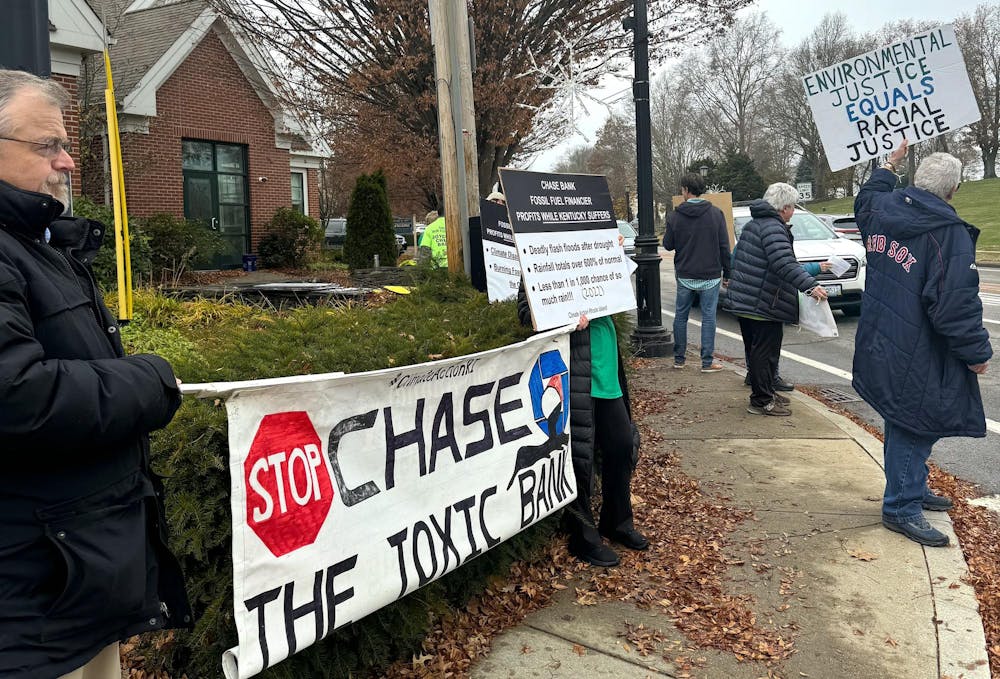On Saturday morning around 11 a.m., roughly 30 community members joined organizers from Climate Action Rhode Island — a local affiliate of the international 350.org climate movement — to protest at JPMorgan Chase Bank in Barrington. The protestors demanded that Chase divest from the fossil fuels industry and urged passersby to boycott the bank until it does so.
The demonstration lasted until 1 p.m., with protestors holding signs that read “Stop Chase, The Toxic Bank,” “Stop Funding Fossil Fuels,” “Boycott Chase Bank” and “Chase Bank, Climate Change Profiteer,” with an illustration of oil flowing from the bank’s logo. Signs also encouraged passing cars to honk in support of the protest.
Brian Wilder, an organizer with CARI, led the crowd in chants, shouting “No more gas, no more oil, keep your poison in the soil.”
Protestors also distributed informational pamphlets detailing Chase’s investment in fossil fuels to passing vehicles.
Calling for a community boycott of Chase Bank, demonstrators distributed email templates for withdrawing funds and closing accounts with the bank. The email templates included demands for banks to “change to green energy sources.”
A few minutes into the protest, an unidentified community member approached the demonstration, shouting “Kids are dying in Gaza” and holding a sign that read “Save,” with several children and the Palestinian flag drawn on it. The protester blocked the intersection for several minutes, obstructing traffic. They also engaged in a verbal altercation with a CARI organizer and later left the scene.
The Herald could not reach the community member for comment.
Barrington Police arrived on the scene at 11:11 a.m. in response to multiple calls regarding traffic obstruction. The community member had already left the intersection.
The officers told protesters that Chase Bank employees requested they remove signs and materials from Chase’s property and remove cars from the bank’s parking lot on Maple Avenue.
Police officers also advised the climate protestors to remain on the sidewalk to avoid disrupting traffic. The officers left after about 20 minutes.
In an email to The Herald, JPMorgan Chase Spokesperson Briana Curran wrote, “Chase is glad to serve consumer and business customers in Barrington and all around Rhode Island.” Employees at the Barrington Chase Bank declined to comment on the protest.
“Through our branches, we hire locally, invest in the local economy and give back by volunteering in the community, listening and addressing the needs of Barrington,” Curran added.
Elizabeth O’Connell, a protest organizer and CARI member, said the organization is “focusing on Chase Bank for the next year.”
“We would like to do one (protest) a month in 2024 targeting all the Chase Banks in Rhode Island,” she said.
Saturday’s protest follows previous CARI demonstrations against the bank. In September 2021, CARI organizers staged a similar protest on Thayer Street, demanding Chase’s divestment and urging passersby to boycott the bank, The Herald previously reported.
O’Connell noted the increase in Chase Bank branches in the state, saying that “up until two years ago, they had very few branches in Rhode Island.” JPMorgan Chase opened its first Rhode Island branch in 2019 and there are now 21 active Chase locations in the state, according to the company’s website.
“Since the 2015 climate accords, Chase Bank has invested over $300 billion in fossil fuel project funding,” CARI organizer David Brunetti said, citing the 2022 Banking on Climate Chaos report.
The report details JPMorgan Chase’s financial contributions, as well as other major banks. In 2022, Chase’s contributions to the fossil fuel industry were the highest out of all major banks, followed by CITI and Wells Fargo, at $382 billion.
Chase’s contributions have now grown to over $434 billion, according to the updated 2023 report.
“What we want them to do is to, instead of investing in fossil fuel projects, put more of that money or all that money (into) renewables,” Brunetti added.
Brunetti also urged community members to boycott Chase and open accounts at banks and credit unions approved by websites like Bank.Green.
Curran defended JPMorgan Chase’s sustainability goals, stating that Chase provides “financing all across the energy sector: supporting energy security, helping clients accelerate their low carbon transitions and increasing clean energy financing with a target of $1 trillion for green initiatives by 2030.”
Brunetti noted the event’s alignment with COP28, an international climate conference centered on multilateral solutions to climate change. The conference, held in Dubai, began on Thursday.
“All we can do is try to locally, regionally, nationally and internationally work with groups to continue to bring attention to the worst offenders,” Brunetti said.
Local high schooler Amity Burock said: “I’m here because we only have a certain number of years and months before the world has no point of return.”
“We can do anything we can to change that, even just protesting,” Burock added. “If enough people see, they’ll start to change and that’s what we really need.”
Protest attendee Camille Nixon said she was at the protest because she feared the impact of climate change on future generations. “I don’t want to kick the can down the path,” she said. “We are responsible. It’s not anybody else.”
“Realistically, will Chase change their policies because a bunch of kooky people are standing in front of their bank waving signs? I don’t know,” said CARI member Will Nakshian. “Does it make a difference? Well, you have to try.”

Tom Li is the editor-in-chief and president of The Herald's 135th editorial board. He is from Pleasanton, California and studies economics and international and public affairs. He previously served as a metro editor, covering the Health & Environment and Development & Infrastructure beats, and has worked on The Herald's copy editing, editorial page board, design and podcast teams.





